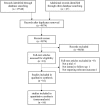Intensive follow-up strategies after radical surgery for nonmetastatic colorectal cancer: A systematic review and meta-analysis of randomized controlled trials
- PMID: 31361784
- PMCID: PMC6667274
- DOI: 10.1371/journal.pone.0220533
Intensive follow-up strategies after radical surgery for nonmetastatic colorectal cancer: A systematic review and meta-analysis of randomized controlled trials
Abstract
Background: Intensive follow-up after surgery for colorectal cancers is common in clinical practice, but evidence of a survival benefit is limited.
Objective: To conduct a systematic review and meta-analysis on the effects of follow-up strategies for nonmetastatic colorectal cancer.
Data sources: We searched Medline, Embase, and CENTRAL databases through May 30, 2018.
Study selection: We included randomized clinical trials evaluating intensive follow-up versus less follow-up in patients with nonmetastatic colorectal cancer.
Interventions: Intensive follow-up.
Main outcomes measures: Overall survival.
Results: The analyses included 17 trials with a total of 8039 patients. Compared with less follow-up, intensive follow-up significantly improved overall survival in patients with nonmetastatic colorectal cancer after radical surgery (HR 0.85, 95% CI 0.74-0.97, P = 0.01; I2 = 30%; high quality). Subgroup analyses showed that differences between intensive-frequency and intensive-test follow-up (P = 0.04) and between short interval and long interval of follow-up (P = 0.02) in favor of the former one.
Limitations: Clinical heterogeneity of interventions.
Conclusions: For patients with nonmetastatic colorectal cancer after curative resection, intensive follow-up strategy was associated with an improvement in overall survival compared with less follow-up strategy. Intensive-frequency follow-up strategy was associated with a greater reduction in mortality compared with intensive-test follow-up strategy.
Conflict of interest statement
The authors have declared that no competing interests exist.
Figures
References
-
- Virgo KS, Vernava AM, Longo WE, McKirgan LW, Johnson FE. Cost of patient follow-up after potentially curative colorectal cancer treatment. Jama. 1995;273(23):1837–41. Epub 1995/06/21. . - PubMed
Publication types
MeSH terms
LinkOut - more resources
Full Text Sources
Medical




